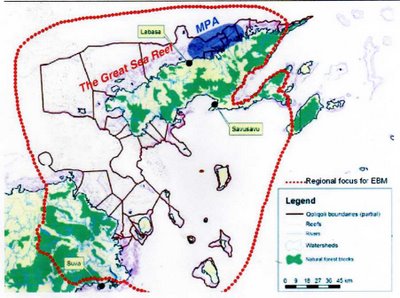I have probably referenced this before but it is quite relevant to the Qoliqoli discussion - about the Great Sea Reef of Macuata which has been given a tabu by the Macuata chiefs. It is a pdf file here. There are some great pics and also a map which shows the qoliqoli areas.

Part of the discussion is as follows:
Despite the relative intactness of the Great Sea Reef (GSR) and the high levels of biodiversity, emerging pressures are threatening the health and integrity of the reef.
The GSR fringes coastal areas of many sugar cane and pine plantations, and the increasing urbanisation around the township of Labasa. Parts of the GSR are also fished commercially for live reef fish, beche-de-mer and trochus. The most damaged sites in terms of siltation, rubbish and high fishing pressures were observed around Labasa.
Commercially important fish were found in very low numbers and considered to be small in size.
Several threats have been identified by the survey team and communities:
• Over-fishing and poaching by illegal fishers.
• The use of small-mesh fishing nets (regulated three inch mesh size).
• Fish poisoning – an old fishing technique which uses the root of a coastal plant ‘duva’
(derris plant).
• Use of hookah for beche-de-mer collection.
• Siltation of near-shore environment caused by erosion and upland activities, especially
near Malau timber factory.
• Dredging of sand for
construction purposes at Mali Passage.
• Development activities such as drainage of blast water by large vessels in Nadamu Passage.
• Untreated waste water from factories and Labasa town.
I think those boundaries overlap into the native fishing grounds of Ra.
ReplyDeleteNote: These areas already have been documented in studies confirming the prospects of oil exploration( Bligh waters, Lau basin). Southern Cross (Aussie company)has already applied for a license. As usual no proceeds go to the actual resource owner.
This is one prime reason why the present wording of the Qoliqoli Bill gives carte blanche to NLTB; with regards to commercial management.
Have you sent in a submission to the appropriate body re the Qoliqoli Bill? Seems like there's a lot of misunderstanding about the implications.
ReplyDeleteAre there seriously companies looking for oil in Fiji waters?
I only want a fair outcome for all concerned.
W.
There are some geologic studies going back to the eighties that indicate formations that may contain oil. Just what Fiji doesn't need. With the rising prices, interest is going to increase. Not only could that be bad news environmentally, BIG OIL never plays nice or fair. Part of the rush to judgement in the case of the alledged Pitcairn sex abuse scandal may have been due to the finding of oil formations nearby. (I am not making a judgement on the cases, just pointing out the convergence of oil discovery and the scandal).
ReplyDeleteEverywhere that oil companies go they try to destabilise the region in order to create an opening for themselves. This is something that bears watching closely.
Thanks for the tip. You are right. But whatever development happens in Fiji even regarding oil exploration, they will go through the rigmoralle of red tape and of Fijians being stirred up about their land and sea. If it happens in Macuata I am sure some of us will be watchful.
ReplyDeletePeceli
Oil in Fiji= problems in Nigeria.
ReplyDeleteYou bet I have sent a submission on the Qoliqoli Legislation(Bill No. 12 of 2006).
There might be a small backlog of Bills in Parliament because the Budget is yet to be even tabled in Novemeber. No Budget means no money and no civil service.
I doubt if the Qoliqoli Bill can make it that time frame, especially when the public consultations is yet to be completed.
It's the Fiji Day celebration in Melbourne today and everyone in the household is tired now - and some are aleady fast asleep. I've been reading Fiji magazines today including the Fiji Island Business one which has some enlightening articles.
ReplyDeleteW.